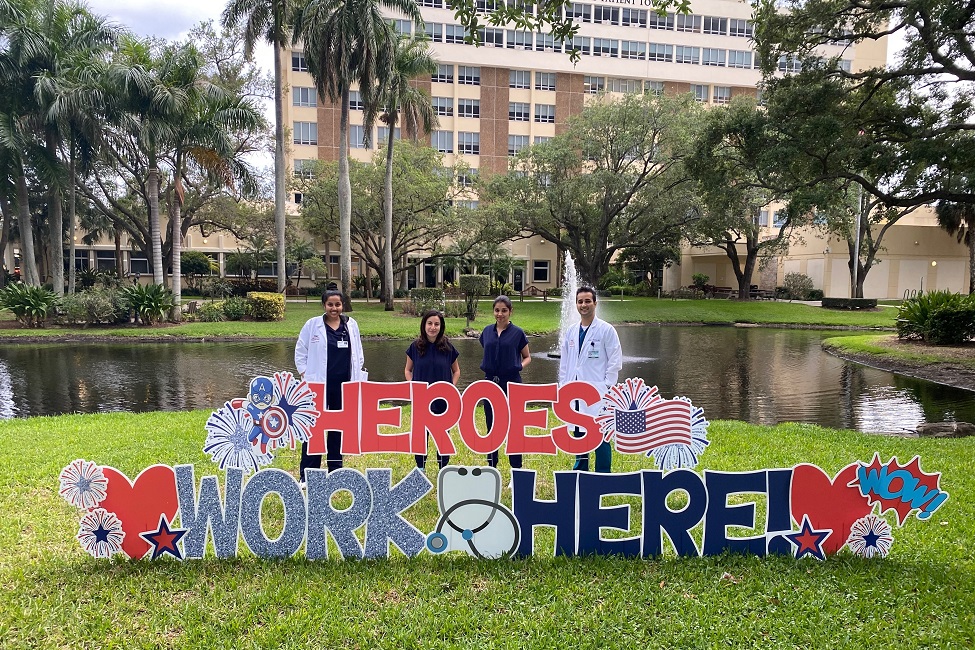FAU Resident Physicians Vital to Region’s Healthcare Workforce

(From left): FAU internal medicine physician residents Suhani Goyal, M.D.; Laura Salama, M.D., chief resident and a new graduate of the program; Wafa Latif, M.D.; and Prashank Neupane, M.D.
Thirty-five physicians from Florida Atlantic University’s Schmidt College of Medicine have completed an important step in their continuum of medical education – residency training. These physicians are the first graduates of FAU’s residency program in emergency medicine, the second class of the general surgery program; and the fourth class of the internal medicine program. In addition, the first fellow of FAU’s Hospice & Palliative Medicine Fellowship Program, which launched in 2019, is among the physician graduates. Taking between three to five years to complete, residency training is required to become a board- certified physician.
With the Association of American Medical Colleges estimating a shortage of up to nearly 122,000 physicians in the United States by 2032, and demand for physicians growing faster than supply, FAU’s resident physicians are creating a critical pipeline for South Florida’s healthcare workforce.
FAU’s residency programs, which also include psychiatry and neurology, are part of the FAU Consortium for Graduate Medical Education (GME). The consortium is a partnership between FAU’s Schmidt College of Medicine and Boca Raton Regional Hospital/Baptist Health South Florida, Bethesda Hospital East/Baptist Health South Florida, and Tenet HealthCare system’s Delray Medical Center, St. Mary’s Medical Center and West Boca Medical Center.
The FAU GME Consortium was formed to further FAU’s commitment to increase much needed medical residency positions in Palm Beach County and to ensure that the region will continue to have an adequate and well-trained physician workforce.
Overall, 64 percent of physicians in FAU’s GME programs remain in Florida; 25 percent remain in South Florida/Palm Beach County; and approximately16 percent are hired to work in FAU’s partner hospitals. An additional 44 percent successfully match into fellowships – additional specialty training for physicians.
Sixty percent of this year’s graduates in internal medicine will remain in Florida for their fellowship or to practice medicine; three of the five graduates in FAU’s general surgery residency will stay in Florida for additional fellowship training or private practice. In addition, 100 percent of the physicians in the general surgery program have passed the General Surgery Qualifying Exam and General Surgery Certifying Exam of the American Board of Surgery. Five of the six resident physicians in emergency medicine are staying in Florida to practice medicine; one of the graduates will be working at Bethesda Hospital East/Baptist Health South Florida, a consortium partner. The physician graduate of FAU’s Hospice & Palliative Medicine Fellowship Program will serve as a nocturnist at Delray Medical Center, also a consortium partner.
“In the midst of the COVID-19 pandemic, our graduates are helping to meet a critical need for a diverse and well-trained physician workforce to serve our community,” said Phillip Boiselle, M.D., dean of FAU’s Schmidt College of Medicine. “Together with our outstanding hospital partners, and our dedicated faculty members, our ability to train physicians locally will help us to meet the needs of our community locally. We are enthusiastic that many of the graduates from our residency programs are staying right here in Palm Beach County to work in our local hospitals, emergency rooms, intensive care units, surgical suites as well as a host of internal medicine practices in this region.”
All of FAU’s residency programs are accredited by the Accreditation Council for Graduate Medical Education (ACGME). The internal medicine residency program accepts 24 categorical residents each year and three preliminary residents who complete a one-year internship before going on to specialty training in their chosen field. The general surgery residency program trains seven categorical residents each year and five preliminary residents. The program is structured into five clinical years and one unique value-added year of scholarship, which is usually completed after the third clinical year. The emergency medicine residency program accepts six residents each year.
“We are incredibly proud of our graduating resident physicians in internal medicine, emergency medicine and general surgery as well as our first fellow of the FAU Hospice & Palliative Medicine Fellowship Program,” said Curtis Whitehair, M.D., associate dean for graduate medical education, designated institutional official, and an associate professor of integrated medical science in FAU’s Schmidt College of Medicine. “As they become board-certified physicians, their contributions, talents and expertise in their respective fields are needed now more than ever. We wish them continued success in their careers, in all of their endeavors and in their lifelong journey in medicine, healing and compassionate care.”
-FAU-
Tags: students | faculty and staff | community | medicine